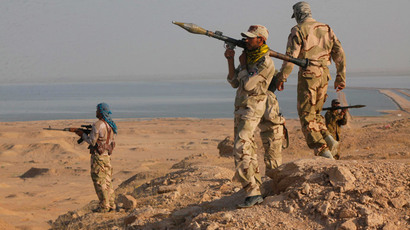Sunni insurgents take over nuclear materials in northern Iraq
Iraq says “terrorist groups” have seized nuclear materials used for scientific research at a university in the country's north. Iraq's UN envoy has appealed for help to "stave off the threat of their use by terrorists in Iraq or abroad."
According to Iraq's UN ambassador, Mohamed Ali Alhakim, about 40
kilograms of uranium compounds were kept at Mosul University. He
added that such materials "can be used in manufacturing
weapons of mass destruction."
"Terrorist groups have seized control of nuclear material at
the sites that came out of the control of the state,"
Alhakim told UN Secretary-General Ban Ki-moon in the July 8
letter obtained by Reuters on Wednesday.
Alhakim warned that the materials could be smuggled out of Iraq.
"The Republic of Iraq is notifying the international community of these dangerous developments and asking for help and the needed support to stave off the threat of their use by terrorists in Iraq or abroad," Alhakim said in a letter.
The UN's nuclear watchdog on Thursday downplayed the significance of the incident.
"On the basis of the initial information we believe the material involved is low grade and would not present a significant safety, security or nuclear proliferation risk," said IAEA spokesperson Gill Tudor.
"Nevertheless, any loss of regulatory control over nuclear and other radioactive materials is a cause for concern."
Uranium can be used to make nuclear weapons, but requires enrichment as well as numerous pieces of technology to produce other components of a nuclear device. But uranium compounds are also toxic and could potentially be used to produce a ‘dirty bomb’, that is a regular explosive device that would disperse the radioactive material to contaminate the area around it.
Iraq acceded to the Convention on the Physical Protection of Nuclear Material on Monday, the IAEA reported. Members of the convention agree to protect nuclear facilities and material to be used for peaceful domestic use, storage, and transport.
"It also provides for expanded cooperation between and among states regarding rapid measures to locate and recover stolen or smuggled nuclear material, mitigate any radiological consequences of sabotage, and prevent and combat related offences," the IAEA stated.
The developement came just one day after Iraq told the UN that insurgents took control of a former chemical weapons facility located north of Baghdad. Alhakim said in a letter to the UN that “armed terrorist groups” took over the Muthanna complex on June 11. The facility holds the remnants of a former chemical weapons program.
In his letter to the UN chief, which was made public on Tuesday, Alhakim also pleaded for help from the international community. "The Government of Iraq requests the States Members of the United Nations to understand the current inability of Iraq, owing to the deterioration of the security situation, to fulfill its obligations to destroy chemical weapons," he said.
Read more: Iraq loses control of chemical weapons depot to ISIS militants
The rapid gains by Sunni insurgents led by the Islamic State group – formerly known as the Islamic State in Iraq and the Levant – have allowed them to declare the territory in Iraq and Syria under their control, to be a new Islamic state, or caliphate. The group is primarily composed of radical Sunni Muslims, and has won the support among those in Iraq disgruntled with the exclusive nature of the country's Shia-dominated central government.
The group took control of the country's second largest city of Mosul on June 10 when Sunni militants drove Iraq’s army out of the city, forcing thousands of civilians to flee. During the takeover, ISIS demolished sacred sites throughout the city, including shrines and mosques.












